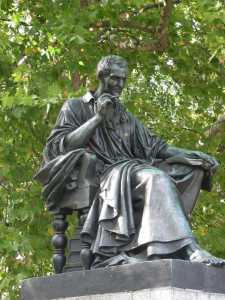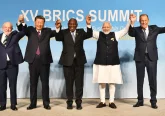Republican thinking today relies heavily on a classical conception of citizenship. Can this ever be compatible with modern commercial society?

If there are resources in republicanism for re-thinking the contemporary economic order, it might be worth turning to a republican thinker who wrote on the topic of political economy. Jean-Jacques Rousseau in “A Discourse on Political Economy” articulated a key worry now held by various groups today, including the Occupy movement, dissatisfied with existing political responses on poverty, education, health care and economic opportunity. For Rousseau, like republican authors before him, that central concern was about extremes in material inequality and their effect in the public sphere. Groups today, even in their criticism of the use of tax loopholes by the wealthy, for instance, echo Rousseau’s sense that the poor man “always bears the burden which his richer neighbour has influence enough to get excepted from.”
Rousseau’s work proposed, among other things, taxation measures targeted at the rich and “objects of luxury” (and there was no doubt, he thought, that one could determine what was and what was not a superfluity). With his various proposals, Rousseau was trying through the state apparatus to get at the root of the problem of inequality, not simply to manage the effects of the problem of inequality. “It is,” he said, “one of the most important functions of government to prevent extreme inequality of fortunes; not by taking away wealth from its possessors, but by depriving all men of means to accumulate it; not by building hospitals for the poor, but by securing the citizens from becoming poor.” Today, policy wonks call this sort of thing ‘predistribution’.
Rousseau’s claim that it was an essential role of government to ensure citizens were neither too poor nor too rich was informed by his commitment to an ideal of citizenship and the republican notion that the state should aim at the common good. For him and others in this tradition, it was the civic virtue of citizens that secured the common good. But in a situation of vast inequality, citizens could not be virtuous and therefore freedom could not be achieved. This was because those with wealth dominated, directing laws in their favor, or in other words, toward sectional or private interest. Extremes in resources also undermined a shared sense of value and perspective. Whereas shared experience and commonality motivated virtuous activity, the lack of a common perspective and lack of a shared sense of values to be pursued reduced the motivation not only to place the good of the community ahead of one’s partial interests, but also to try with one’s fellow citizens to identify a common good in the first place.
This issue, however, about the nature of citizenship in republican thought and the (pre)conditions for certain kinds of citizen activity pose a difficulty when turning to republicanism for guidance in contemporary democracies. Accordingly there are two interrelated questions that need to be explored in considering what a republican political economy could mean for today: First, what will it demand of citizens or what ideal of citizenship is being adopted? Second, to what degree will market institutions be challenged?
Rousseau’s ideas about the common good and citizenship place him in a classical tradition of republican thought that was mostly hostile to commerce and commercial society. Commerce and commercial societies not only undermined the ideal of citizen-farmer-soldier, but also introduced a competing system of motivations and values to those central to republican thought.
Commerce against virtue?
The tension between virtue and commerce was at the heart of the ‘luxury debates’ of 18th century Europe. Those who critiqued commercial society and its increasing wealth and luxury in republican terms considered commerce and moveable capital as corrupting of citizen virtue. Commerce, and the luxury to which it was thought to give rise, encouraged boundless appetites and selfishness, drawing individuals away from public life by coaxing them to prefer private pleasures. Commercial society created a set of incentives and fostered values that encouraged individualism and materialism, which made wealth rather than political virtue a main good to be sought. Accordingly, it also undermined the political culture needed for nurturing a virtuous citizenry by displacing republican norms and examples, which in turn was deeply subversive of civic education.
In other words, commercial activity and markets themselves were viewed as corrupting of citizens in their relationships with each other by changing their practices, perspectives and mores. Markets and market values, in particular, were threatening because they invaded areas of human activity that were central to the building of civic character. The mark of corruption, Rousseau thought, was when virtue was “rated at a market price,” and this together with other developments associated with commercial society were the “causes of opulence and of poverty, of public interest, of mutual hatred among citizens, of indifference to the common cause, of the corruption of the people, and of the weakening of all the springs of government.”
Thinkers associated with the Scottish Enlightenment who defended commerce and luxury similarly thought commercial society involved its own system of values, principles and motivations. In defending commerce, luxury, politeness and sociability, they shifted, “the locus of virtue,” J. G. A. Pocock said in an essay in Wealth and Virtue, “decisively from the civic to the civil, from the political and military to that blend of the economic, culture and moral which we call the social for short.”
For thinkers like Adam Smith, activity in the market operated according to the exchange of utility, and networks of cooperation could be built from individuals pursuing their own interests. Even more, individuals did not need to sacrifice their personal interest or property in order for politics to go well. David Hume thought the political environment might even be more moderate in such circumstances. Indeed, while republicans had tied the rise of self-interest to a negative story of change and corruption, in this nascent language of political economy of the eighteenth century, individuals’ pursuit of their private interest was thought to be consistent not just with social and political order, as Albert O. Hirschman argued in The Passions and the Interests, but with social and political progress. Private interest could be the engine of progress. Yes, luxury weakened civic virtue, but it also created economic demand and fuelled economic growth.
The other threat to republican virtue in the late eighteenth century, which formed a point of contention especially in the American context between the Federalists and the Anti-Federalists, was the sheer size of the territorial state. It was axiomatic in the republican tradition prior to the late eighteenth century that republics had to be small. Monarchy was appropriate for large states, but not republics. The worry for those adopting republican ideas was that as the size of the state increased, such growth stretched the bonds between citizens and their sense of collective identification, removing the very grounds needed for encouraging virtuous activity in the public sphere.
The re-definition of the republic to include a vast territory was performed in part by figures like James Madison and Abbe Sieyes, who drew up constitutions involving programs of limited government that made possible individual security, a form of citizen-rule and commerce. The small-state argument of the Anti-Federalists was laid to waste by Madison’s claim that the way to solve the problem of faction was to control its effects through the sheer size and clash of interests within the American republic. Around this time, “imagined communities,” as Benedict Anderson has argued, became increasingly possible through print media, providing some motivation on the part of large populations to think and act collectively.
But for republicans embracing the ideal of civic virtue, even though this new form of collective imagining might create a sense of community of some sort, it would not be sufficient for motivating the right kind of political behavior. The presence of face to face moments between citizens, or the possibility of those moments, was still considered as crucial for fostering a shared sense of belonging, motivating the pursuit of the common good and securing laws and institutions from turning into mechanisms through which group interests competed. Patriotism was kindled, as Rousseau said, among those “with whom we have to live,” adding that this attachment to our fellow citizens in our immediate community received “new force because we are in the habit of seeing them…”
Contemporary republicanism: too classical?
Contemporary republicanism in academic political theory – neo-republicanism – is partly informed by a critique of liberal democracy and proposed as a corrective to the problematic effects of markets and individualism. But the version of republicanism proposed as part of this corrective is classical in perspective, especially in the work of political theorists such as Philip Pettit, Maurizio Viroli and Michael Sandel.
Despite shedding some classical features, such as service in citizen militias or the exclusion of vast numbers of people from citizenship, neo-republicans profoundly share with the classical tradition its emphasis on the tight interconnection between good citizens, good norms and good laws and institutions. Pettit in Republicanism: A Theory of Freedom and Government says Machiavelli teaches the “importance of having civil norms that mesh with political laws,” citing Machiavelli’s advice: ‘“Just as good morals, if they are to be maintained, have need of the laws, so the laws, if they are to be observed, have need of good morals.’” Contemporary republican thought adopts the classical proviso that one needs all of these parts working together or the entire project fails. Additionally, classical and neo-republicans share the central claim that the achievement of freedom and the stability of republican laws and institutions depend on widespread civic virtue on the part of the citizenry. But in these ways, neo-republicans have turned back to the ideal of the virtuous republic that the rise of commercial society and territorial states unraveled.
Neo-republicans do not reject the market itself, but as Cécile Laborde and John Maynor say, republicans “object to the market society, where market relations spill into, and corrupt, parts of life where they should not reign supreme.” Yet, these thinkers do not explain why they are not similarly concerned as classical republicans were about the threat the very accommodation of commercial society and its egoism poses to republican ideals. They offer no argument as to how the spread of market values can be contained, so as not to invade the political sphere or to shape citizens’ desires, perspectives, relationships and dispositions, even though today most citizens are participants in the market. Given the pervasiveness of commercial society, it would seem that contemporary thinkers would be even more vulnerable to this problem than classical republicans.
The problem yet to be solved: civic virtue in a market economy
Thus, key questions in thinking about the shape and commitments of a republican political economy for today are: What kinds of demands are going to be placed on citizens and on their political behavior? Are these compatible with the kinds of behavior promoted by wide use of markets?
Merely exhorting citizens to be more engaged, more community-oriented, more cooperative, more virtuous is not enough. We must ask again whether the tension between commerce and virtue can be overcome. Is there some kind of reconciliation possible that has not yet been imagined?
Jessica Kimpell (University of Oxford, DPhil, 2010) is an adjunct assistant professor at Columbia University, teaching in the Political Science Department and in the Core Curriculum for Columbia College. She is a political theorist who specializes in republican thought and is currently working on a project on Tocqueville’s ideas and his relationship to republicanism.
This post is part of Democratic Wealth, a collaborative project hosted by OurKingdom and Politics in Spires.







No Comment